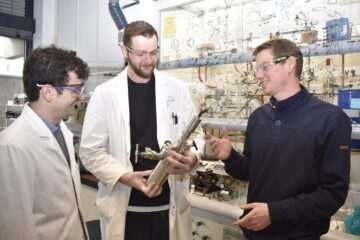Climate change — research suggests it is not a swindle

Lauded and criticised for offering a possible way out of the dangers of man made climate change, UK TV Channel 4's programme “The Great Global Warming Swindle”, broadcast in 2007, suggested that global warming is due to a decrease in cosmic rays over the last hundred years.
This would cause a decrease in the production of low clouds allowing more heat from the sun to warm the Earth and cause global warming.
Research published today, Thursday 3 April, in the Institute of Physics' Environmental Research Letters shows how a team from Lancaster and Durham Universities sought a means to prove the correlation between the ionizing cosmic rays and the production of low cloud cover.
Previous research had shown a possible hint of such a correlation, using the results of the International Satellite Cloud Climatology Project, and this had been used to propose that global warming was all down to cosmic rays.
The new research shows that change in cloud cover over the Earth does not correlate to changes in cosmic ray intensity. Neither does it show increases and decreases during the sporadic bursts and decreases in the cosmic ray intensity which occur regularly.
One such very large burst caused the magnetic storm which blacked out the power in Quebec in 1989.
Professors Sloan from Lancaster University and Wolfendale from Durham University write, “No evidence could be found of changes in the low cloud cover from known changes in the cosmic ray ionization rate.”
Media Contact
More Information:
http://www.iop.orgAll latest news from the category: Physics and Astronomy
This area deals with the fundamental laws and building blocks of nature and how they interact, the properties and the behavior of matter, and research into space and time and their structures.
innovations-report provides in-depth reports and articles on subjects such as astrophysics, laser technologies, nuclear, quantum, particle and solid-state physics, nanotechnologies, planetary research and findings (Mars, Venus) and developments related to the Hubble Telescope.
Newest articles

Lower dose of mpox vaccine is safe
… and generates six-week antibody response equivalent to standard regimen. Study highlights need for defined markers of mpox immunity to inform public health use. A dose-sparing intradermal mpox vaccination regimen…

Efficient, sustainable and cost-effective hybrid energy storage system for modern power grids
EU project HyFlow: Over three years of research, the consortium of the EU project HyFlow has successfully developed a highly efficient, sustainable, and cost-effective hybrid energy storage system (HESS) that…

Safer alternative for an explosive reaction
The chemical industry has been using a reaction with explosive chemicals for over 100 years – now Mülheim scientists have discovered a safer alternative. The Ritter Group of the Max…





















